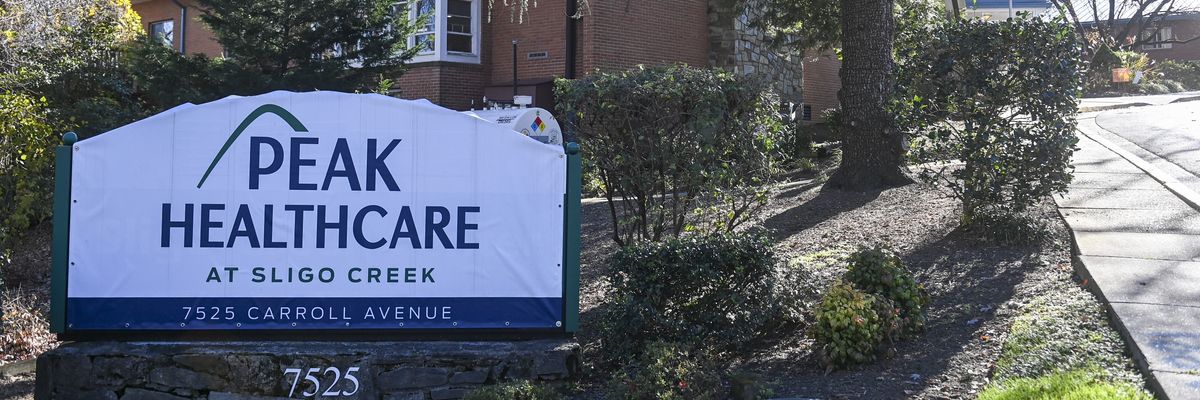
The entrance of a private equity-owned healthcare facility was pictured in Tacoma Park, Maryland on November 29, 2020.
Infections and Falls More Likely at Private Equity-Owned Hospitals: Study
Patients at hospitals acquired by private equity firms saw a 25% increase in adverse events, new research shows.
A study published Tuesday in the Journal of the American Medical Association found that patients are more likely to fall or suffer infections at hospitals owned by private equity firms, whose role in the U.S. healthcare system has grown exponentially in recent years.
The study uses Medicare claims data from between 2009 and 2019 to compare patient complications at private equity-acquired hospitals and control facilities not owned by private equity. Dr. Sneha Kannan, a critical care physician and the study's lead author, told The New York Times that she was surprised by the extent of the difference between the two.
Patients at private equity-owned hospitals saw a 25.4% increase in adverse events such as falls and dangerous central-line bloodstream infections in the three years after the acquisition, according to the new study—even though the private equity hospitals analyzed in the paper tended to have younger and lower-risk patients.
"Surgical site infections doubled from 10.8 to 21.6 per 10,000 hospitalizations at private equity hospitals despite an 8.1% reduction in surgical volume; meanwhile, such infections decreased at control hospitals," the study shows.
The results indicate that the quality of inpatient care is significantly worse at hospitals owned by private equity firms, which are notorious for bleeding companies dry for a quick profit at the expense of workers and local communities. Over the past decade, private equity companies have dramatically extended their reach in U.S. healthcare, purchasing physician practices, hospice care facilities, nursing homes, and hospitals.
"It's now a familiar story: Private equity buys out a hospital, saddles it with debt, and then reduces operating costs by cutting services and staff—all while investors pocket millions."
The new study in JAMA offers the latest evidence of the private equity industry's increasingly harmful effects on the U.S. healthcare system, which already leaves tens of millions of people uninsured and vulnerable to medical and financial disaster.
A report released earlier this year by the consumer advocacy group Public Citizen notes that "private equity has targeted segments of the healthcare industry since at least the 1990s, with many predictable outcomes."
"Among them, shocking lapses in safety have occurred, prices have risen faster than at non-private-equity-acquired entities and patients have been subjected to price gouging schemes," the report states. "The conflict between providers' obligations to provide the best care and private equity investors' insatiable appetites for maximized provides is clear."
The new peer-reviewed study was published just weeks after the Senate Budget Committee launched a bipartisan investigation into the negative impacts of private equity ownership on U.S. hospitals.
"As private equity has moved into healthcare, we have become increasingly concerned about the associated negative outcomes for patients," Sen. Sheldon Whitehouse (D-R.I.), chair of the budget panel, said in a statement earlier this month.
"From facility closures to compromised care, it's now a familiar story: Private equity buys out a hospital, saddles it with debt, and then reduces operating costs by cutting services and staff—all while investors pocket millions," the senator added. "Before the dust settles, the private equity firm sells and leaves town, leaving communities to pick up the pieces."
An Urgent Message From Our Co-Founder
Dear Common Dreams reader, The U.S. is on a fast track to authoritarianism like nothing I've ever seen. Meanwhile, corporate news outlets are utterly capitulating to Trump, twisting their coverage to avoid drawing his ire while lining up to stuff cash in his pockets. That's why I believe that Common Dreams is doing the best and most consequential reporting that we've ever done. Our small but mighty team is a progressive reporting powerhouse, covering the news every day that the corporate media never will. Our mission has always been simple: To inform. To inspire. And to ignite change for the common good. Now here's the key piece that I want all our readers to understand: None of this would be possible without your financial support. That's not just some fundraising cliche. It's the absolute and literal truth. We don't accept corporate advertising and never will. We don't have a paywall because we don't think people should be blocked from critical news based on their ability to pay. Everything we do is funded by the donations of readers like you. Will you donate now to help power the nonprofit, independent reporting of Common Dreams? Thank you for being a vital member of our community. Together, we can keep independent journalism alive when it’s needed most. - Craig Brown, Co-founder |
A study published Tuesday in the Journal of the American Medical Association found that patients are more likely to fall or suffer infections at hospitals owned by private equity firms, whose role in the U.S. healthcare system has grown exponentially in recent years.
The study uses Medicare claims data from between 2009 and 2019 to compare patient complications at private equity-acquired hospitals and control facilities not owned by private equity. Dr. Sneha Kannan, a critical care physician and the study's lead author, told The New York Times that she was surprised by the extent of the difference between the two.
Patients at private equity-owned hospitals saw a 25.4% increase in adverse events such as falls and dangerous central-line bloodstream infections in the three years after the acquisition, according to the new study—even though the private equity hospitals analyzed in the paper tended to have younger and lower-risk patients.
"Surgical site infections doubled from 10.8 to 21.6 per 10,000 hospitalizations at private equity hospitals despite an 8.1% reduction in surgical volume; meanwhile, such infections decreased at control hospitals," the study shows.
The results indicate that the quality of inpatient care is significantly worse at hospitals owned by private equity firms, which are notorious for bleeding companies dry for a quick profit at the expense of workers and local communities. Over the past decade, private equity companies have dramatically extended their reach in U.S. healthcare, purchasing physician practices, hospice care facilities, nursing homes, and hospitals.
"It's now a familiar story: Private equity buys out a hospital, saddles it with debt, and then reduces operating costs by cutting services and staff—all while investors pocket millions."
The new study in JAMA offers the latest evidence of the private equity industry's increasingly harmful effects on the U.S. healthcare system, which already leaves tens of millions of people uninsured and vulnerable to medical and financial disaster.
A report released earlier this year by the consumer advocacy group Public Citizen notes that "private equity has targeted segments of the healthcare industry since at least the 1990s, with many predictable outcomes."
"Among them, shocking lapses in safety have occurred, prices have risen faster than at non-private-equity-acquired entities and patients have been subjected to price gouging schemes," the report states. "The conflict between providers' obligations to provide the best care and private equity investors' insatiable appetites for maximized provides is clear."
The new peer-reviewed study was published just weeks after the Senate Budget Committee launched a bipartisan investigation into the negative impacts of private equity ownership on U.S. hospitals.
"As private equity has moved into healthcare, we have become increasingly concerned about the associated negative outcomes for patients," Sen. Sheldon Whitehouse (D-R.I.), chair of the budget panel, said in a statement earlier this month.
"From facility closures to compromised care, it's now a familiar story: Private equity buys out a hospital, saddles it with debt, and then reduces operating costs by cutting services and staff—all while investors pocket millions," the senator added. "Before the dust settles, the private equity firm sells and leaves town, leaving communities to pick up the pieces."
A study published Tuesday in the Journal of the American Medical Association found that patients are more likely to fall or suffer infections at hospitals owned by private equity firms, whose role in the U.S. healthcare system has grown exponentially in recent years.
The study uses Medicare claims data from between 2009 and 2019 to compare patient complications at private equity-acquired hospitals and control facilities not owned by private equity. Dr. Sneha Kannan, a critical care physician and the study's lead author, told The New York Times that she was surprised by the extent of the difference between the two.
Patients at private equity-owned hospitals saw a 25.4% increase in adverse events such as falls and dangerous central-line bloodstream infections in the three years after the acquisition, according to the new study—even though the private equity hospitals analyzed in the paper tended to have younger and lower-risk patients.
"Surgical site infections doubled from 10.8 to 21.6 per 10,000 hospitalizations at private equity hospitals despite an 8.1% reduction in surgical volume; meanwhile, such infections decreased at control hospitals," the study shows.
The results indicate that the quality of inpatient care is significantly worse at hospitals owned by private equity firms, which are notorious for bleeding companies dry for a quick profit at the expense of workers and local communities. Over the past decade, private equity companies have dramatically extended their reach in U.S. healthcare, purchasing physician practices, hospice care facilities, nursing homes, and hospitals.
"It's now a familiar story: Private equity buys out a hospital, saddles it with debt, and then reduces operating costs by cutting services and staff—all while investors pocket millions."
The new study in JAMA offers the latest evidence of the private equity industry's increasingly harmful effects on the U.S. healthcare system, which already leaves tens of millions of people uninsured and vulnerable to medical and financial disaster.
A report released earlier this year by the consumer advocacy group Public Citizen notes that "private equity has targeted segments of the healthcare industry since at least the 1990s, with many predictable outcomes."
"Among them, shocking lapses in safety have occurred, prices have risen faster than at non-private-equity-acquired entities and patients have been subjected to price gouging schemes," the report states. "The conflict between providers' obligations to provide the best care and private equity investors' insatiable appetites for maximized provides is clear."
The new peer-reviewed study was published just weeks after the Senate Budget Committee launched a bipartisan investigation into the negative impacts of private equity ownership on U.S. hospitals.
"As private equity has moved into healthcare, we have become increasingly concerned about the associated negative outcomes for patients," Sen. Sheldon Whitehouse (D-R.I.), chair of the budget panel, said in a statement earlier this month.
"From facility closures to compromised care, it's now a familiar story: Private equity buys out a hospital, saddles it with debt, and then reduces operating costs by cutting services and staff—all while investors pocket millions," the senator added. "Before the dust settles, the private equity firm sells and leaves town, leaving communities to pick up the pieces."

